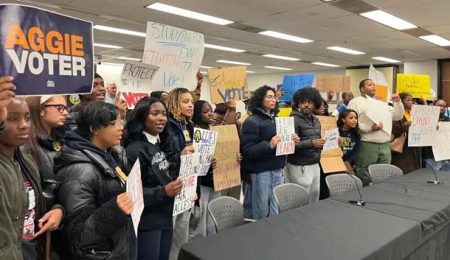“Raise the Age” Law Puts Teens on Notice
Teenagers who commit serious felonies will immediately be charged as adults under new law.
 By Cash Michaels –
By Cash Michaels –
As of Sunday, December 1, young people ages 16 to 17 years of age face stiffer criminal penalties in the state of North Carolina, thanks to the new “Raise the Age” law.
It is described as a tool to help local police departments combat serious teenage crime that has lately been on the rise, including assaults, armed robberies, and shootings.
When the teen suspects appear in courts, they will be treated and charged as adult suspects, law enforcement officials say. The new law passed by veto override last week.
“I remain concerned that this new law would keep some children from getting treatment they need while making communities less safe.” Gov. Cooper wrote when he vetoed the measure.
Supporters counter that juvenile justice cases are mounting for area prosecutors to the point where putting many of these cases immediately in the adult criminal justice system cuts red tape and makes sense, thus easing their case loads.
House bill 834 formally states:
“An Act to Modify the Definition of Delinquent Juvenile, to Modify the Transfer Process for Indicted Juvenile Cases, to Create a New Process to Remove a Case to Juvenile Court, to Make Changes to School Use of Information, to Make Secure Custody Hearing Changes, to Make Technical Corrections, to Make Changes to Certain Dispositional Alternatives, and to Increase the Punishment for an Adult to Solicit a Minor to Commit a Crime and to Modify the Number of Days for Request for Review by a Prosecutor.
The law defines a juvenile delinquent as:
a) Any juvenile who, while less than 16 years of age but at least 10 years of age, commits a crime or infraction under State law or under an ordinance of local government, including violation of the motor vehicle laws, or who commits indirect contempt by a juvenile as defined in G.S. 5A-31, and
b) Any juvenile who, while less than 18 years of age but at least 16 years of age, commits a crime or an infraction under State law or under an ordinance of local government, excluding the offenses in sub-sub-subdivisions 1. and 2. of this sub-subdivision, or who commits indirect contempt by a juvenile as defined in G.S. 5A-31.
Offenses excluded from the definition of delinquent juvenile when committed while less than 18 years of age but at least 16 years of age include the following:
All violations of the motor vehicle laws under Chapter 20 of the General Statutes.
Any offense punishable as a Class A, B1, B2, C, D, or E felony if committed by an adult, together with any offense based on the same act or transaction or on a series of acts or transactions connected together or constituting parts of a single scheme or plan of that offense, and any greater or lesser included offense of that offense.
c) Any juvenile who, while less than 10 years of age but at least 8 years of age, commits a Class A, B1, B2, C, D, E, F, or G felony under State law.
d) Any juvenile who, while less than 10 years of age but at least 8 years of age, commits a crime or an infraction under State law or under an ordinance of local government, including violation of the motor vehicle laws, and has been previously adjudicated delinquent.”







